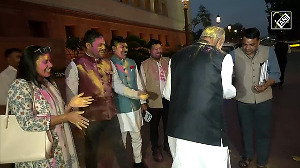 Canadian Prime Minister Stephen Harper and Indian Prime Minister Manmohan Singh announced late on Saturday night that they had reached an agreement on the civilian nuclear agreement, after a year of negotiations.
Canadian Prime Minister Stephen Harper and Indian Prime Minister Manmohan Singh announced late on Saturday night that they had reached an agreement on the civilian nuclear agreement, after a year of negotiations.
The two leaders had met on the sidelines of the Commonwealth leaders' convention in Port of Spain this week, and had earlier met in New Delhi this month.
"When I was in India, Prime Minister Singh and I discussed a number of items including a nuclear cooperation agreement that Canada and India that was very close to completion. Prime Minister Singh and I agreed that it should be brought to a conclusion very rapidly.
"Our officials have met, and thanks to Prime Minister Singh's leadership, we have now got the agreement between the two countries," said Harper in the presence of Singh.
Harper termed the deal as "a tremendous development, just a tremendous opportunity for both countries".
Canada, Harper stated, "is an integrated supplier in the nuclear energy field. India has an expanding economy with great energy needs. We will be taking a little bit of time to complete the normal legal text and ratification processes, but this is a tremendous economic step forward and a tremendous step forward in our relations".
Singh referred to discussions they had when Harper was in Delhi a few days ago.
"During our interactions, we discussed the ways and means of expanding the content of our relationship to widen it and deepen it every possible way. And among the things that had been hanging for some time was the desire of both our countries to negotiate an international civil nuclear power agreement. India's needs for nuclear energy are enormous, just as we need a lot more energy to make a success of our developing presence."
Singh complimented Harper for having "proved to be absolutely true to his word".
"He told me that he would have this matter looked into. (That this) exercise has been completed in a short period of eight to 10 days is a tribute to Prime Minister Harper's great leadership and the way the civil service functions in Canada," Singh said.
"It speaks extremely well of the development of our relations. India and Canada have been partners in development. Ever since India became Independent, we have had a large community of Indian origin in Canada, so we have all these bonds of friendship, which Prime Minister Stephen Harper and I are committed to further develop in every possible way," he added.
Singh explained said the "the negotiation of this civil nuclear cooperation agreement" was a very important step forward, "a milestone for the development of our relations".
"I thank Prime Minister Harper from the core of my heart for having expedited this process beyond my expectations."
On his flight back from Delhi on November 19, Harper had hinted to rediff.com's US-based weekly India Abroad that the deal may be clinched soon, saying, "we have narrowed it (civilian nuclear agreement) down to a small number of issues. I am convinced, after my chat with Prime Minister Singh, that we can iron out these differences soon".
Harper's visit to India turned out to be productive for both countries. Now, Canadian companies will soon be rushing to India in large numbers to sell Uranium and other nuclear technologies, to compete in the open market with the Russians, French and Americans.
A backgrounder provided by the Canadian government says the agreement "will allow Canadian firms to export and import controlled nuclear materials, equipment and technology to and from India, while ensuring that Canadian supplied goods and technology are used for peaceful, civilian purposes".
The agreement "will allow Canadian companies to offer a full array of equipment, services and uranium supply to the Indian civilian nuclear market," it said.
According to the Canadian government, "India's civilian nuclear energy market is expected to be worth anywhere from $25 billion to $50-billion" within the next 20 years.
"India and Canada are natural partners in the joint promotion and development of heavy water technology reactors. There are a number of opportunities to work together as strategic partners in global markets. Canada is a supplier of both nuclear technology and uranium fuel that can help India to meet its growing energy needs," it said.
Canada's exports to India in the nuclear field "could range from engineering services, design and construction of plants and subsystems, balance of plants, uranium supply, mining, to safety assessments and licensing".
Image: Canadian Prime Minister Stephen Harper with Indian Prime Minister Manmohan Singh in Port of Spain | Photograph: Prime Minister Office






 © 2025
© 2025